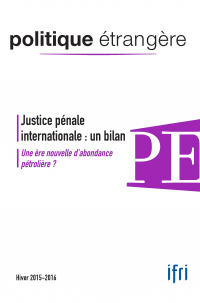How are women jihadists prosecuted and sentenced in different European countries? What happens when they are incarcerated? What reintegration programs are in place for women formerly detained for terrorism-related offenses?

Homeland Security

The porosity of borders has become a key characteristic of contemporary international relations. While this has long been recognized for trade and information networks, it also has an impact on the field of defense and security.
The impossibility of clearly separating internal from external threats is not a new phenomenon, as demonstrated by the many attacks of international origin that hit the Paris area during the 1970s and 1980s.
Although the concept of a defense and security continuum has reached a consensus since the publication of the 2008 Defense White Paper in France, there is still a need to anticipate future internal-external interactions and understand their implications for the French population’s collective security.
Established within Ifri’s Security Studies Center, the objective of the Homeland Security program is to study more specifically:
- The process of radicalization (the role of social networks as tools of ideological radicalization and informal mobilization, the emergence of new forms of violent opposition, the repercussions of the Israeli-Palestinian conflict in France)
- Terrorism (the evolution of the international jihadist movement, the potential physical and cyber threats on critical infrastructure, the improvement of prevention and repression procedures)
- Technological and sanitary risks (early warning procedures, pandemics)
Deputy Director of Ifri, Editor-in-Chief of Politique étrangère, and research fellow at the Security Studies Center
...La Guerre de vingt ans was awarded the Prize for the best book on geopolitics in 2021.
France has traditionally taken a security-based approach to the fight against terror. It was a latecomer to the field of radicalization prevention and the establishment of disengagement programs aimed at jihadists. It only started to think seriously about the issue in 2013 and its first...
Despite a relative weakening since 2017, the international jihadist movement should continue to pose a genuine threat over the next decade.
In the context of a persistent impunity enjoyed by organized crime and drug trafficking groups, many countries in Latin America, and especially Mexico and Colombia, have opted to assign military personnel to internal security tasks.
This study, based on original judicial sources, assesses the profiles of 137 individuals sentenced in France for cases related to jihadism.
In the week following Trump’s election, Ifri published a study to identify the likely changes in U.S. foreign policy. From the outset, this election appeared as a change in the U.S.’ trajectory, with consequences on the power relations and functioning of the international system.
This paper assesses the current state of the jihadist threat to France, as well as the French authorities’ security response. With the upcoming presidential election, 2017 will be a decisive year for the country. Terrorism will be at the heart of the campaign and ISIS will most likely try to...
The 2015 terror attacks in France and the ensuing activation by the Ministry of Defense of its homeland protection plan opened a new phase in the long history of the French Army’s involvement in internal security.
To date, a few thousand Europeans have left Europe to join jihadi fighters in Syria and Iraq. Several hundreds of them have already returned. To deal with this phenomenon, some countries have developed radicalization prevention and de-radicalization programs.
Hybrid Threats – Tasks and Challenges for the Intelligence Community Brown Bag Seminar Series
Ifri is pleased to announce the fourth conference in our intelligence series, in partnership with the Intelligence College in Europe, the purpose of which is to analyze the threat landscape through the eyes of senior officials from various European countries.
A Threat Assessment from Spain: the Sahel and Beyond Brown Bag Seminar Series
Ifri is pleased to announce the third conference in our intelligence series, in partnership with the Intelligence College in Europe, the purpose of which is to analyze the threat landscape through the eyes of senior officials from various European countries.
Shedding New Light on Terrorism in France
France is the Western country the most severely impacted by acts of terrorism. Some 1300 French citizens have left for Syria and Iraq, among which 330 have returned.
France facing jihad in Syria and Iraq Les Mensuelles Ifri/Entreprises
These luncheons debates are exlusively dedicated to corporate members and individual benefactor members or Ifri. By personal invitation.
In a polarized France, President Emmanuel Macron must navigate the conflict in a way that doesn’t further inflame the public or advantage his political rivals.
"Still now I have the images of the corpses next to my feet": Olivier Laplaud and his wife were in the Bataclan enjoying themselves amongst a crowd of 1,500 people when everything changed in an instant.
France has repatriated more than half the people it defined as radical Islamists living in the country without a residence permit since 2018. Now it wants to extend the penalty and deport even more.
PARIS - France said Thursday it would suspend joint military operations with Malian forces after the West African country's second coup in nine months, adding to international pressure for the military junta to return civilians to positions of power.
German Defence Minister Annegret Kramp-Karrenbauer has called for closer bilateral cooperation with France in light of the tense security situation in Europe marked by the Russian “threat”, the rise of China and spreading “Islamist terrorism” in the Sahel region.
Sentinel represents a watershed development in French military operations. For the first time since the end of the Cold War, the number of French army soldiers actively deployed in metropolitan France roughly equals that of overseas operations. But the military establishment here is far...
The alliance is struggling to assemble four battalions to safeguard its eastern flank from a possible Russian attack. In addition, many member states are falling short of their...
One week after the terrorist attacks in Paris, the police killed two jihadists in Belgium. Officials said that the two men were coming back from Syria and were on the brink of targeting Brussels. The capital of Belgium was already targeted a few months ago: in May 2014,...
For the past two years, French experts on terrorism have felt anxious. They often emphasized: “The question is not whether France will be targeted by a terrorist attack, but when.” The dreaded attack took place on January 7th, 2015. That evening, various speakers across the...

























